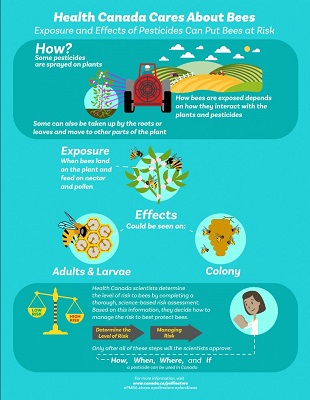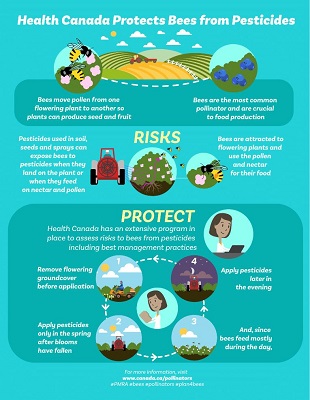Pollinator protection
Pollinators are organisms that help transfer pollen from one flowering plant to another. This fertilizes plants so that they can produce seeds and fruit.
With over 800 native species in Canada, bees are the most common pollinators. Other pollinators include butterflies, moths, wasps, flies, some types of beetles, hummingbirds and certain bats. Bees and other insect pollinators are critical to the production of many crops and play an essential ecological role. Crops that depend on the work of pollinators include tree and berry fruit, canola, alfalfa, squash, and melon.
Pollinator health and pesticides
Declines in honeybee and other pollinator populations have generated considerable scientific and public interest both in Canada and internationally. A number of factors are seen as potential contributors to these declines and no single factor has been identified as the cause. The available science suggests that multiple factors acting in combination may be at play, including loss of habitat and food sources, diseases, viruses and pests, and pesticide exposure.
Some pesticides pose an immediate or "acute" threat to bees. Some may pose a threat after longer-term "chronic" exposure. Health Canada receives information to assess both the acute and chronic risks to adult and larval bees from pesticides. In order to protect pollinators, the labels of pesticides that pose such risks specify detailed use directions to reduce potential exposure. These include restrictions on pesticide spraying on flowering crops or weeds where bees may be present. All precautions and directions on pesticide labels must be followed.
Health Canada activities
Health Canada's Pest Management Regulatory Agency (PMRA) is the federal authority for pesticide regulation. To help ensure agricultural practices across the country protect pollinators, Health Canada actively works with key stakeholders and federal and provincial agriculture and environment ministries. Health Canada also collaborates with other pesticide regulators internationally. These collaborations help develop risk assessment methods and data requirements, and improve understanding of the potential effects on bees and how risks can be better managed.
There has been much discussion on the potential risk to bees and pollinators from the use of neonicotinoid insecticides. In 2012, Health Canada began receiving large numbers of bee incident reports. Many incidents were determined to be related to bee exposure to neonicotinoids through dust generated during planting of neonicotinoid treated corn and soybean seeds. In 2014, based on bee mortality incidents, Health Canada implemented additional restrictions for growers when planting corn and soybean seeds treated with neonicotinoids in order to protect pollinators from dust generated during planting of treated seed. A pollinator specific re-evaluation was also initiated for neonicotinoids, and was completed in 2019. In order to protect pollinators, Health Canada cancelled many uses of neonicotinoids on crops that bees find attractive, such as orchard trees, and prohibited spraying of some crops, such as berries and fruiting vegetables, before or during bloom.
Find out more information on Health Canada's work on the Neonicotinoid insecticides webpage.
Best management practices for pollinator protection
The following best management practices include measures that can be taken by growers and pesticide applicators to protect bees and other insect pollinators including honeybees, from pesticide exposure.
- Protecting Pollinators during Pesticide Spraying - Best Management Practices
- Protecting pollinators when using treated seed - Best Management Practices
- Practices to Reduce Bee Poisoning from Agricultural Pesticides, Pollinator Partnership Canada
The following are Canadian crop-specific guides on best management practices for the protection of pollinators. These crop-specific guides include information for growers, pesticide applicators and beekeepers about crop pollination and practices to protect pollinators from pesticides. These Canadian crop-specific guides were developed by Pollinator Partnership Canada with support from Health Canada and can be found on the Pollinator Partnership Canada website, under Resources, Agricultural Guides.
- Apples, Protecting Pollinators from Pesticides
- Apples, Supplement to Protecting Pollinators from Pesticides
- Canola, Protecting Pollinators from Pesticides
- Canola, Supplement to Protecting Pollinators from Pesticides
- Cucurbits, Protecting Pollinators from Pesticides
- Cucurbits, Supplement to Protecting Pollinators from Pesticides
- Highbush Blueberry, Protecting Pollinators from Pesticides
- Highbush Blueberry, Supplement to Protecting Pollinators from Pesticides
- Wild Blueberry, Protecting Pollinators from Pesticides
- Wild Blueberry, Supplement to Protecting Pollinators from Pesticides
Additional best management practices and pollinator resources
- OECD Work Related to Bees/Pollinators, Organisation for Economic Co-operation and Development
- Pollinator Resources, Pollinator Partnership Canada
- Canadian Association of Professional Apiculturists (CAPA), Annual Colony Loss Reports
Risk assessment
Health Canada's risk assessment framework for bees was developed and published in 2014 in cooperation with the United States Environmental Protection Agency (USEPA) and the California Department of Pesticide Regulation.
The framework has steps or tiers that move from artificial laboratory-based studies to more complex and realistic field-based studies. Bee exposure to pesticides and the resulting effects are assessed at each step. The first tier identifies potential risk to bees, and higher tiers refine the risk characterization. The complete tiered risk assessment framework considers the following evidence:
- Acute and chronic exposure risks to bees
- Risks to the different life stages of bees, including adults and larvae
- Risks to individual bees and to bees that live in colonies
- Risks to all bees, including Apis bees (honey bees) and non-Apis bees such as bumble bees and solitary bees
- How attractive the treated crops or plants are to bees
- How, when, where and if the pesticide will be used in Canada
Ultimately, the tiered pollinator risk assessment framework provides the foundation for Health Canada's evidenced-based risk decisions on pesticides.
The pollinator risk assessment framework and guidance in the links that follow represent an advancement in how Health Canada assesses the risks posed by pesticides to bees, and allows improved pollinator protection in the department's regulatory decisions and risk mitigation measures.
Health Canada also cooperates internationally through the Organisation for Economic Co-operation and Development (OECD) and the International Commission for Plant-Pollinator Relationships (ICPPR) Bee Protection Working Group to develop improvements to pollinator risk assessment and mitigation, including development of test guidelines and guidance documents.
- Guidance for Assessing Pesticide Risks to Bees, USEPA, Health Canada's PMRA, California Department of Pesticide Regulation; can be accessed at Pollinator Risk Assessment Guidance, USEPA
- PMRA Guidance Document, Health Canada's Approach to Environmental Risk Assessment for Pest Control Products – Canada.ca
- OECD Work Related to Bees/Pollinators, OECD
- Bee Protection Group, International Commission for Plant-Pollinator Relationships (ICPPR)
How to report suspected pollinator pesticide poisonings
For suspected bee poisonings related to pesticides, contact the appropriate federal or provincial authority:
- British Columbia (Ministry of Agriculture): 604-556-3129
- Alberta (Ministry of Agriculture and Rural Development): 780-415-2314
- Saskatchewan (Ministry of Agriculture): 306-953-2304
- Manitoba (Department of Agriculture and Resource Development): 204-945-4825
- Ontario (Ministry of the Environment, Conservation and Parks): 1-866-663-8477
- Québec (Ministère de l'Agriculture, des Pêcheries et de l'Alimentation): 1-844-ANIMAUX (1-844-264-6289)
- Nova Scotia (Department of Agriculture): 902-679-8998
- Prince Edward Island (Department of Agriculture and Forestry): 902-314-0816
- New Brunswick (Department of Agriculture, Aquaculture and Fisheries): 506-453-2108
- Newfoundland and Labrador (Department of Natural Resources): 709-637-2662
You can contact Health Canada's Pest Management Regulatory Agency at 1-800-267-6315.
More information about the Health Canada Pest Management Regulatory Agency Incident Reporting Program and how to report suspected incidents is available on the Health Canada website.

